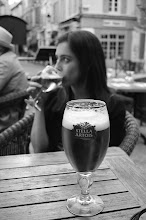My book karma has been excellent lately! I've been into lighter non-fiction, and somehow they just keep turning up in my library queue.
First up:
The Lost Ravioli Recipes of Hoboken by Laura Schenone. What do you do when you find your great-grandmother's ravioli recipe and it includes Philidelphia cream cheese? Go back to the source, in this case, the lemony, herby hills of Liguria.
My favourite part of this book was her sheer determination to learn to make authentic ravioli. I love my job, and I quite like yoga and reading, but I'm just not that passionate about anything. I borrowed her passion for an afternoon and make ravioli myself. It was delicious, and I felt like I'd really accomplished something other than stacks of marking.
I also really liked the way that she was honest about her own struggles with her family and the ambiguity of looking for "authentic" family traditions. In the end, her father prefers ravioli with cream cheese. Who cares.
Next up:
Bringing up Bebe by Pamela Druckerman.
Dogs are, of course, not human. You can leave your annoying dog in the house and go to yoga. You can't do this with your child, your spouse or your coworker. But some of Druckerman's advice jells with my favourite pieces of dog-related advice which I am convinced also work on the humans in your life.
1. Decide what your limits are (the French
cadre) and stick to them. Mozart is allowed to sleep in the bed and climb on the couch, but he wears a cat collar from Walmart and he isn't allowed to pee on the landscaped shrubs or grass in front of the apartment building. I was on the strata. Those shrubs cost more than he did.
2. Observe before acting. On walks, Mozart prefers maniacal sniffing to covering actual ground. Treats weren't working. Pulling wasn't working. Finally, I read somewhere (Caesar?) to observe how dogs behave together. When we picked him up from the breeder, his aunties herded him around the kitchen like a herd of boarder collies with one small sheep. Now, I just walk right up behind him and cajole him on his furry little way.
3. You have to mean no.
Final book:
The Churchills in Love and War by Mary S. Lovell.
Someone once told Winston Churchill that his infant child looked like him. He replied that all babies look like him. It's funny because it's true!
His family is full of American dollar princesses, Dukes, expensive cases of champagne, crumbling country houses, ambition, dysfunctional children and, of course, hilarity. This was a great read.
















